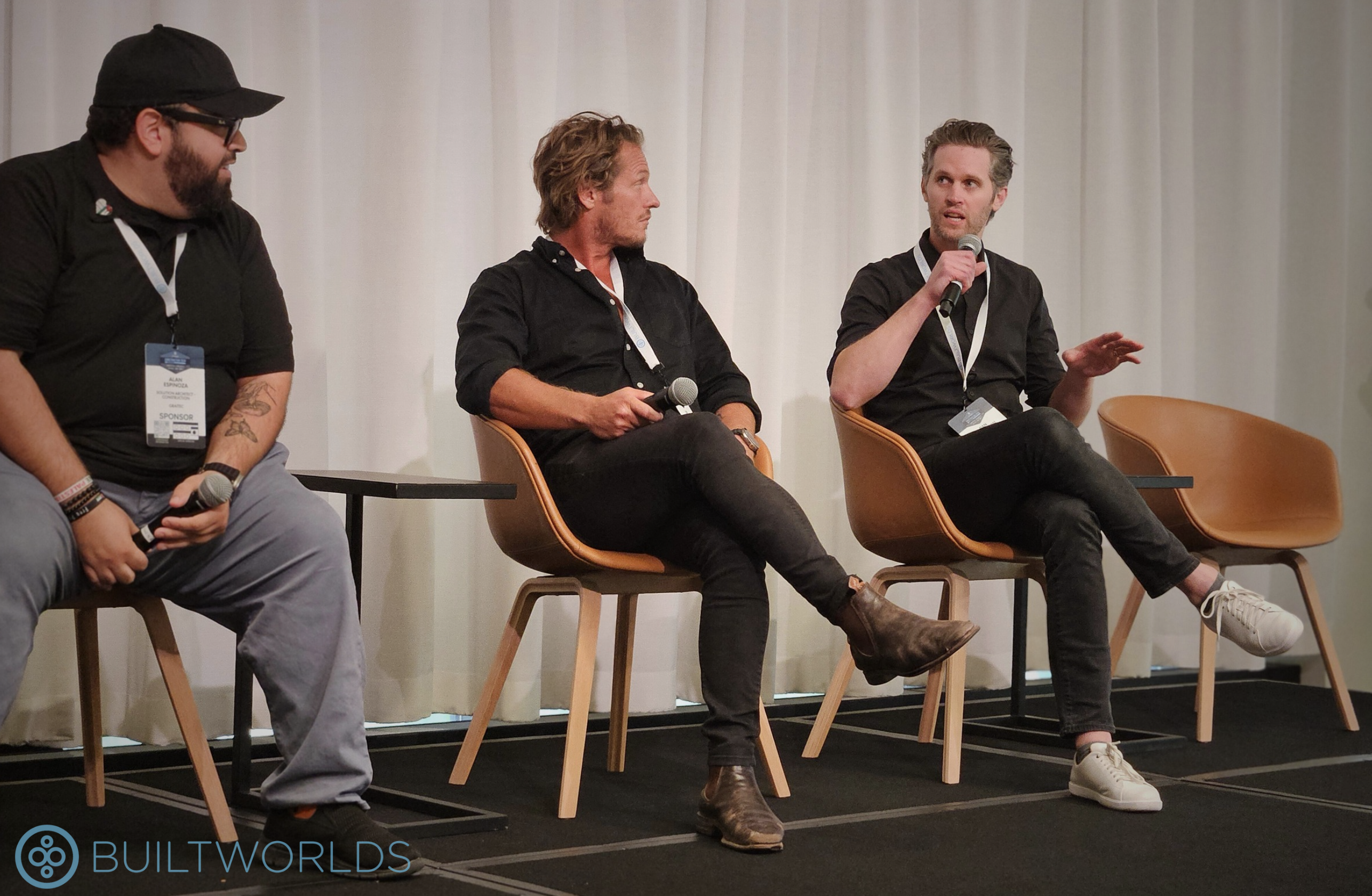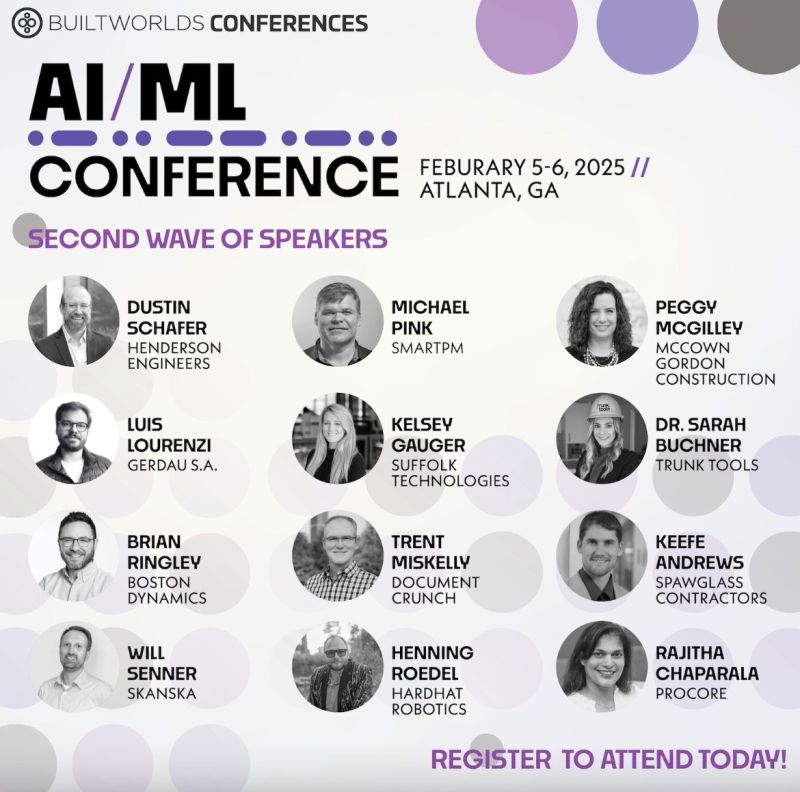Wrapping up my first year at BuiltWorlds has been a wonderful experience. Watching the AI/ML Preparedness Research Track grow during this introductory year has been an honor. As I look forward to the upcoming AI/ML Conference, I wanted to take a moment to reflect on some of the highlights that have made this year so memorable.
Learning From The Best
I’ve particularly enjoyed my time diving deep into the world of AI/ML with subject matter experts at various Forum meetings and conferences throughout the year. Each interaction has provided an abundance of lessons and unique insights into the ways in which AI/ML technology is shaping the AEC industry today.
Construction Tech Standouts
One standout moment was a presentation by Burns & McDonnell Director of Innovation Jeff Danely at the Construction Tech Conference about the company’s collaboration with Google on an AI-powered RFP system. The RFP360 system worked by uploading a new RFP and creating a system-generated summary, allowing for the identification of conflicting statements and similar projects, as well as a response checklist. Additionally, their solution had an RFP chatbot assistant and RFP response generation. This was a fascinating glimpse into how an AI-powered solution can transform a traditionally time-intensive process with streamlined workflows.

The Construction Tech Conference also offered the opportunity to moderate a panel discussion on Smart Foundations: Preparing for AI and ML Integration in Construction. I was lucky to share the stage with four incredibly talented and insightful individuals. Dan Williamson, Director of Artificial Intelligence at Ryan Companies; Joel Hutchins, Managing Director at Imago; Ivy Nyguen, Investor at Autotech Ventures; and Alan Espinoza, AEC Technical Marketing Manager at Autodesk, contributed to a compelling panel on a topic that’s easy to feel stale, with so much buzz surrounding it.
At the time, the initial hype around AI was only starting to dissipate, and we took the opportunity to think critically about this newfound technology. Panelists urged leaders not to seek AI for the sake of AI. A common phrase heard throughout both the panel and the conference at large was “don’t trust, always verify,” meaning to never blindly accept the results of LLMs or other AI solutions. Rather, do your own due diligence on every output—still useful advice.
Informative Forums
Karoliina Tortiila, director of AI at Trimble, was equally inspiring at an April AI/ML Preparedness Forum meeting. She walked through Trimble’s approach to AI implementation. Karoliina highlighted visual-based analysis use cases, like SketchUp Diffusion and an introduction of text to visual models. Her detailed presentation of AI use cases in areas like planning and design, coupled with strategic insights, showcased the practical, forward-thinking integration of AI companies like Trimble are pioneering.
The Data Pathways series, a collection of monthly Forum meetings for AI/ML Track members leading up to the AI/ML conference, has been a continued success. This comprehensive set of discussions focused on fundamental aspects of working with data—from data strategy and governance, to data cleaning and warehousing—has set the tone for AI/ML Track members ahead of the 2025 AI/ML Conference. These sessions, with insights from leaders at Burger Consulting, EllisDon, ARCO, and Pomerleau, have served as an invaluable foundation for understanding the critical role data plays in AI/ML preparedness.
Data considerations have been a fundamental focus of the Track throughout the year, echoed in conversations at BuiltWorlds’ Inaugural AI/ML Meeting, the Building Conference, and the Paris Summit. We will continue this conversation at the upcoming AI/ML Conference with the highly anticipated panel on Strategic Conversation on Data and AI Implementation featuring Aleksey Chuprov, Suffolk; Rajitha Chaparala, Procore; Ted Jennings, Barton Malow; and David Grosshaesch, Mortenson.
Interviews with Experts
Another rewarding aspect of my work has been the opportunity to hear and learn from those directly working with AI in the AEC industry. Profiling industry leaders through my Working with AI series, I’ve had the opportunity to interview several distinguished individuals on their roles and involvement with AI/ML technology in the buildings and infrastructure spaces.
Most recently, I chatted with Amr Rafaat, Director of Innovation at Windover Construction. Amr walked me through Windover’s cutting-edge work across the globe and highlighted his passion and expertise in transformative use cases for AI in construction. Amr also showcased innovative work, from the early implementation of Autodesk’s digital twin solution, Tandem, to creating an AI-enabled Automated Plan Review System for a project in the UAE.
I also spoke with Luis Lourenzi, Lead Data and AI Product Manager at Gerdau, who highlighted his firm’s approach to AI/ML implementation in areas like predictive maintenance models and HR inquiries.
Luis and Amr will both be speaking on panels at the upcoming AI/ML conference, continuing to share their abundance of knowledge and wisdom with the BuiltWorlds audience.
Prior to both of the aforementioned conversations, I spoke with Pomerleau Artificial Intelligence Specialist Majid Seydgar, who boasts a more technical background than many in the industry, with a PhD in engineering and a Master’s in geomatics engineering and remote sensing. Majid highlighted the current role and future potential of generative AI in the field.
This month, AI/ML Preparedness Track members will have the opportunity to learn more from Majid about generative AI as he hosts the final virtual forum meeting in the Data Pathways Forum series.
Advancing Research
This year also marked the release of the first AI/ML Preparedness Introductory Research Reports. These reports provide an overview of AI-powered solutions identified by benchmark survey respondents, along with insights into the solutions’ maturity ratings and satisfaction scores. While AI-powered claims might feel ubiquitous in solutions across the industry, 3 of the 22 tech specialty areas surveyed had no identified solutions utilizing AI technology. Across each of the five major categories, the building technology category, and particularly planning & design solutions, were identified to have the highest volume of AI solutions. In the majority of tech specialty areas, the average satisfaction rating of solutions using AI is higher than that of solutions not using AI.
I encourage members to access the full reports to better understand the depth of our research on AI-powered solutions being used across tech specialty areas in the industry. For non-members, highlights are available to explore here.
Looking ahead, I’m excited to release the 2025 AI/ML survey to further BuiltWorlds’ industry-leading research on AI adoption. This new survey represents the next steps in BuiltWorlds’ mission to provide industry-leading insights into AI/ML technology, implementation, and preparedness in the AEC space.
A Year In Review
Reflecting on the past year, I feel incredibly fortunate to be a part of a community so deeply committed to innovation and advancement in an industry that is vital to humanity. The growth of the AI/ML Preparedness Research Track, connections I’ve made with industry leaders at events, and the opportunity to contribute to BuiltWorlds research have all made this year a meaningful and memorable one.
As we embark into 2025, I remain grateful to everyone who has contributed to the success of the AI/ML Preparedness Track and our greater work here at BuiltWorlds. Here’s to another year of learning and innovation in the ever-evolving work of AI/ML in the AEC industry.












Discussion
Be the first to leave a comment.
You must be a member of the BuiltWorlds community to join the discussion.